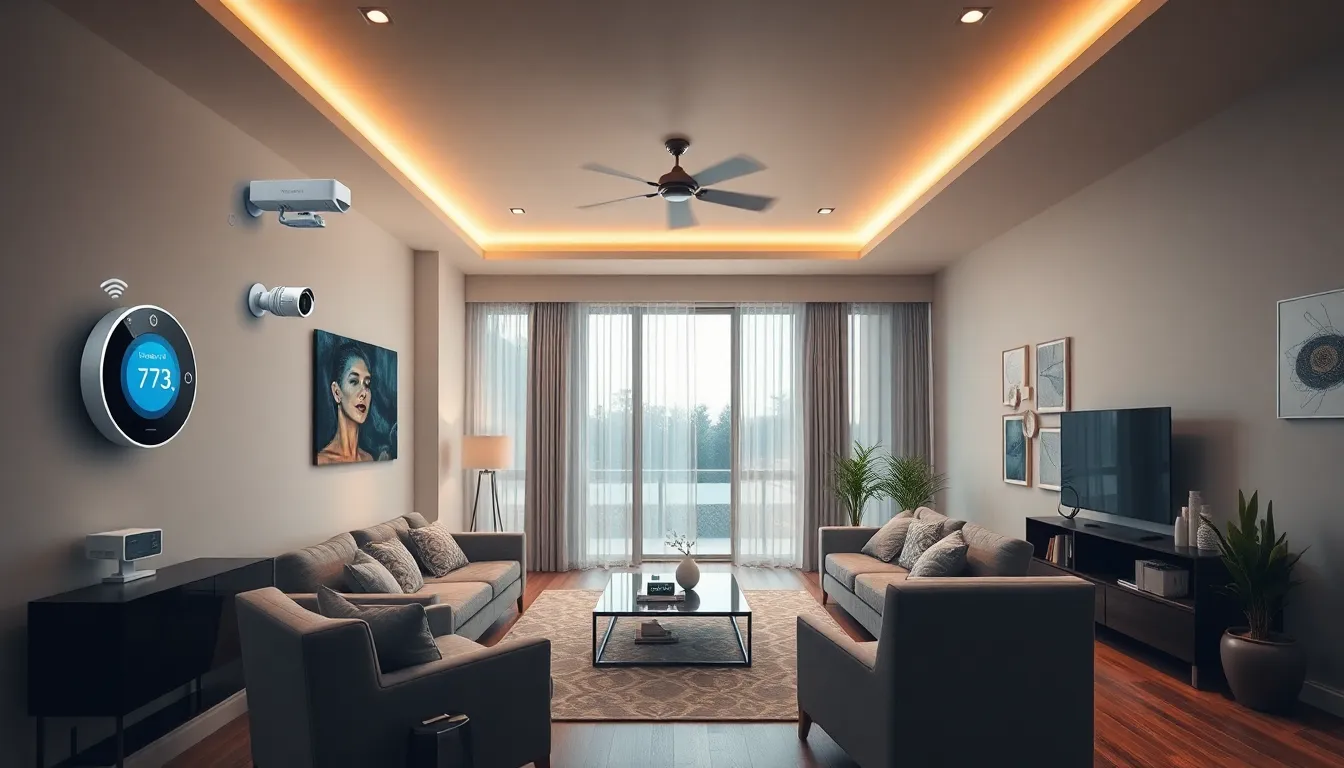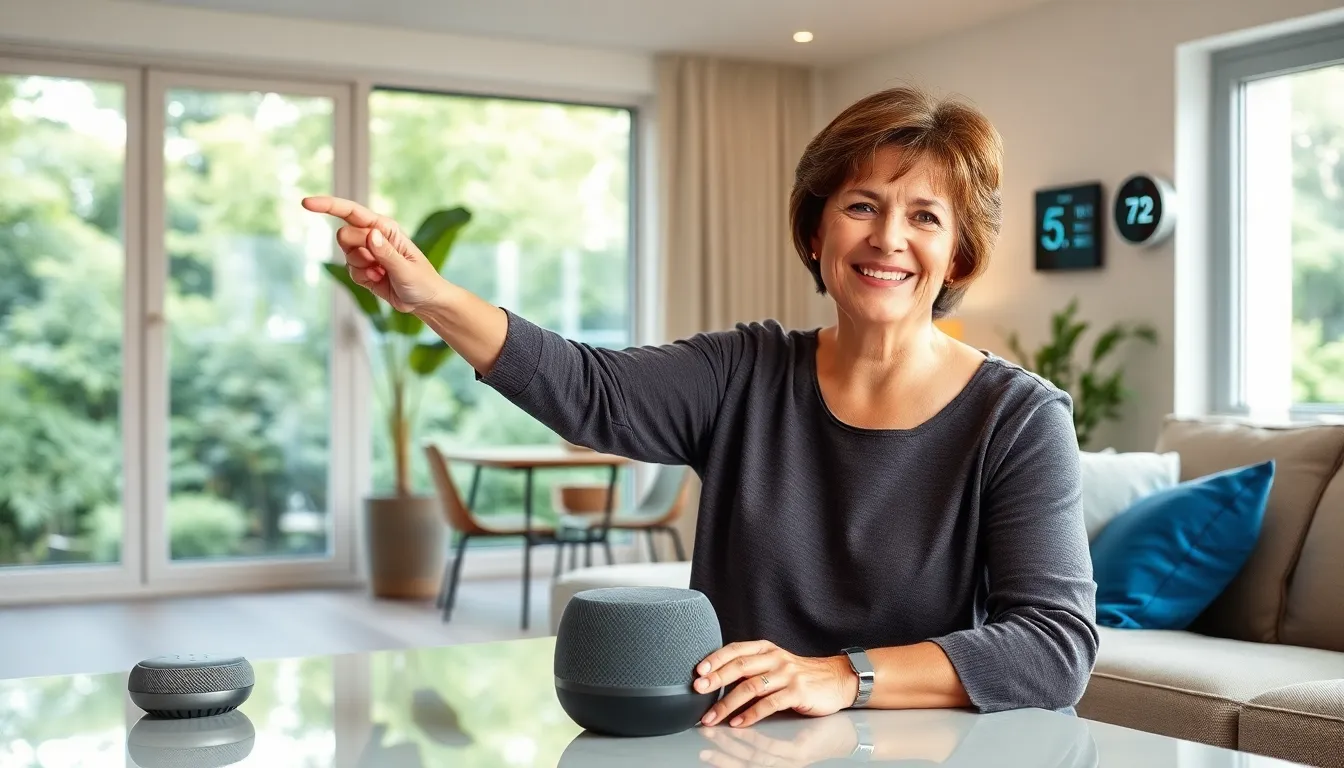Imagine waking up to a home that knows you better than your best friend. With AI in smart homes, that dream is becoming a reality. This technology isn’t just for tech enthusiasts anymore; it’s for anyone who wants a little extra magic in their daily routine. From lights that dim when you’re binge-watching your favorite show to thermostats that adjust before you even realize you’re cold, AI is turning ordinary houses into extraordinary homes.
But it’s not all about convenience. AI also offers enhanced security and energy efficiency, making life easier and more sustainable. So why not let your home do the heavy lifting? Embrace the future where your house doesn’t just shelter you—it understands you. Get ready to explore how AI is revolutionizing smart homes and transforming lives, one gadget at a time.
Table of Contents
ToggleOverview of AI in Smart Homes
AI technology significantly reshapes smart homes, enhancing functionality and user experience. Smart devices learn from user behavior, allowing for automation tailored to each individual’s routine. Lights adjust automatically based on occupancy, while temperature regulation adapts to personal preferences. Increased energy efficiency emerges as systems optimize energy usage, minimizing waste without sacrificing comfort.
Security functionality improves markedly with AI integration. Surveillance cameras equipped with facial recognition can alert homeowners to unfamiliar faces. Additionally, intelligent alarm systems can differentiate between normal events and potential threats. Real-time data enhances monitoring, making homes safer.
Health and wellness also benefit from AI advancements. Smart home systems can track air quality and suggest adjustments to improve living conditions. Voice-activated assistants streamline communication, enabling seamless control of devices throughout the home. Such interaction fosters a dynamic living environment that adapts to evolving needs.
Data collected by AI systems leads to insightful predictions. Predictive maintenance alerts users when appliances need service, preventing costly repairs. Personalized recommendations enhance user experiences, suggesting energy-saving modes or entertainment options based on previous activity.
Embracing AI in smart homes positions users at the forefront of technological integration. The convergence of convenience, security, and efficiency defines modern living. As AI continues to evolve, the capabilities of smart homes will similarly expand, putting control firmly in the hands of the homeowner.
Benefits of AI in Smart Homes

AI technology in smart homes brings several advantages, enhancing convenience, safety, and efficiency for homeowners. Key benefits include improved security features and better energy management.
Enhanced Security Features
Smart homes integrate AI to boost security through advanced monitoring systems. Surveillance cameras equipped with facial recognition technology distinguish between familiar faces and strangers, alerting homeowners to potential intrusions. Automated alarm systems analyze behavior patterns to filter out false alarms, improving trust in security measures. Real-time notifications keep homeowners informed about unusual activities, allowing for timely responses. AI also enables remote access, giving property owners control over their home security from anywhere, ensuring peace of mind.
Energy Efficiency and Management
AI optimizes energy usage within smart homes, contributing to sustainability. Intelligent systems learn household routines, adjusting heating, cooling, and lighting based on occupancy and preferences. Smart thermostats predict temperature needs, reducing wastage and cutting energy bills. Appliance management features send alerts for energy-saving modes based on usage patterns, promoting efficient consumption. These advanced capabilities decrease environmental impact and enhance overall comfort, making homes truly smart in their energy management efforts.
Key Technologies Behind AI in Smart Homes
Smart homes leverage various key technologies, enabling enhanced automation and user interaction. Machine learning algorithms and natural language processing represent significant advancements in this realm.
Machine Learning Algorithms
Machine learning algorithms enable smart devices to learn from user behavior over time. These algorithms analyze data patterns, leading to personalized automation. For instance, they might automatically adjust lighting based on when a homeowner typically arrives. Predicting preferences extends to temperature settings, ensuring comfortable living conditions throughout the day. The algorithms gather insights from usage patterns, resulting in energy-efficient adjustments. Additionally, these systems contribute to predictive maintenance, notifying users when appliances require servicing. Smart devices equipped with machine learning capabilities actively improve user experiences by adapting to individual routines and habits.
Natural Language Processing
Natural language processing (NLP) facilitates seamless interaction between users and smart home systems. NLP allows voice-activated assistants to comprehend and respond to spoken commands effectively. By interpreting various phrases, these systems understand specific requests or broader commands such as “turn off all lights.” Understanding context enhances user experience, making communication intuitive. Furthermore, NLP supports multilingual capabilities, broadening accessibility for diverse users. Smart home systems can continuously improve through user interactions, refining their responses based on feedback and preferences. Overall, NLP transforms how individuals engage with technology, making smart homes more intuitive and user-friendly.
Challenges and Limitations
AI integration in smart homes encounters notable challenges that affect user experience and system reliability.
Privacy Concerns
Privacy concerns rank high among issues related to AI in smart homes. Data collection occurs constantly as devices learn user behavior. Unauthorized access to sensitive information can lead to significant risks. Surveillance systems equipped with AI algorithms may infringe on personal privacy by recording everyday activities. Users often worry about how their data is stored and who has access to it. Consequently, establishing robust security measures and transparent policies becomes essential for developer credibility. Striking a balance between convenience and security remains a critical challenge for users embracing AI in their homes.
Integration with Existing Systems
Integration with existing systems poses another significant hurdle for AI implementation. Many homes feature a mix of legacy systems and newer technologies with varied compatibility. Outdated devices often lack the necessary frameworks for seamless AI integration. Compatibility issues can arise, obstructing communication between devices from different manufacturers. Developers face pressure to create universal solutions that accommodate a broad spectrum of products. Successful integration enhances user experience, but achieving it requires substantial effort and resources. Smart home ecosystems thrive when devices collaborate effortlessly to improve daily living.
Future Trends in AI in Smart Homes
AI technology continues to evolve, driving innovations in smart homes. Personalization will play a critical role, with systems becoming even more adept at understanding individual habits and preferences. Users can expect devices to utilize advanced algorithms for making real-time adjustments to environments, including lighting and temperature.
Energy efficiency remains a pivotal focus. Intelligent systems equipped with machine learning will optimize power usage through predictive analytics. These systems can analyze data patterns to determine the most efficient times for heating, cooling, and lighting, minimizing waste and lowering utility costs.
Integration of voice-activated technology is set to become more sophisticated. Enhanced natural language processing (NLP) capabilities will enable devices to understand complex commands and conversations better. This advancement will create a more intuitive user experience, allowing seamless interaction.
Security measures will also advance. Smart home devices will increasingly incorporate advanced facial recognition and anomaly detection systems. These security features will enhance monitoring capabilities, providing homeowners with peace of mind through real-time alerts and remote access.
Improvement in health monitoring will be another vital trend. AI systems will evolve to track and analyze air quality, alerting users to any harmful changes. Recommendations for indoor environment adjustments will ensure healthier living conditions, enhancing overall well-being.
As these technologies advance, interoperability will become essential. Future smart home systems will likely support seamless collaboration across diverse devices and platforms. This progress will facilitate a unified experience, ensuring all systems function harmoniously.
Consumer trust will be paramount as AI technologies become more prevalent. Addressing privacy concerns through robust data protection measures will instill confidence in users. Transparent policies about data usage will foster a secure environment, encouraging wider adoption of AI in smart homes.
AI’s integration into smart homes is revolutionizing how people live. By enhancing convenience security and energy efficiency it creates a more personalized and sustainable environment. As technology advances homeowners can expect even greater customization and smarter systems that adapt to their needs.
The future promises improved interoperability among devices and robust security measures to protect user data. With AI continuously evolving smart homes will not only respond to commands but also anticipate needs. Embracing this technology allows homeowners to enjoy a seamless living experience that prioritizes comfort and safety.
As AI shapes the landscape of modern living it’s clear that the smart home of tomorrow will be a true reflection of its inhabitants’ lifestyles and preferences.




